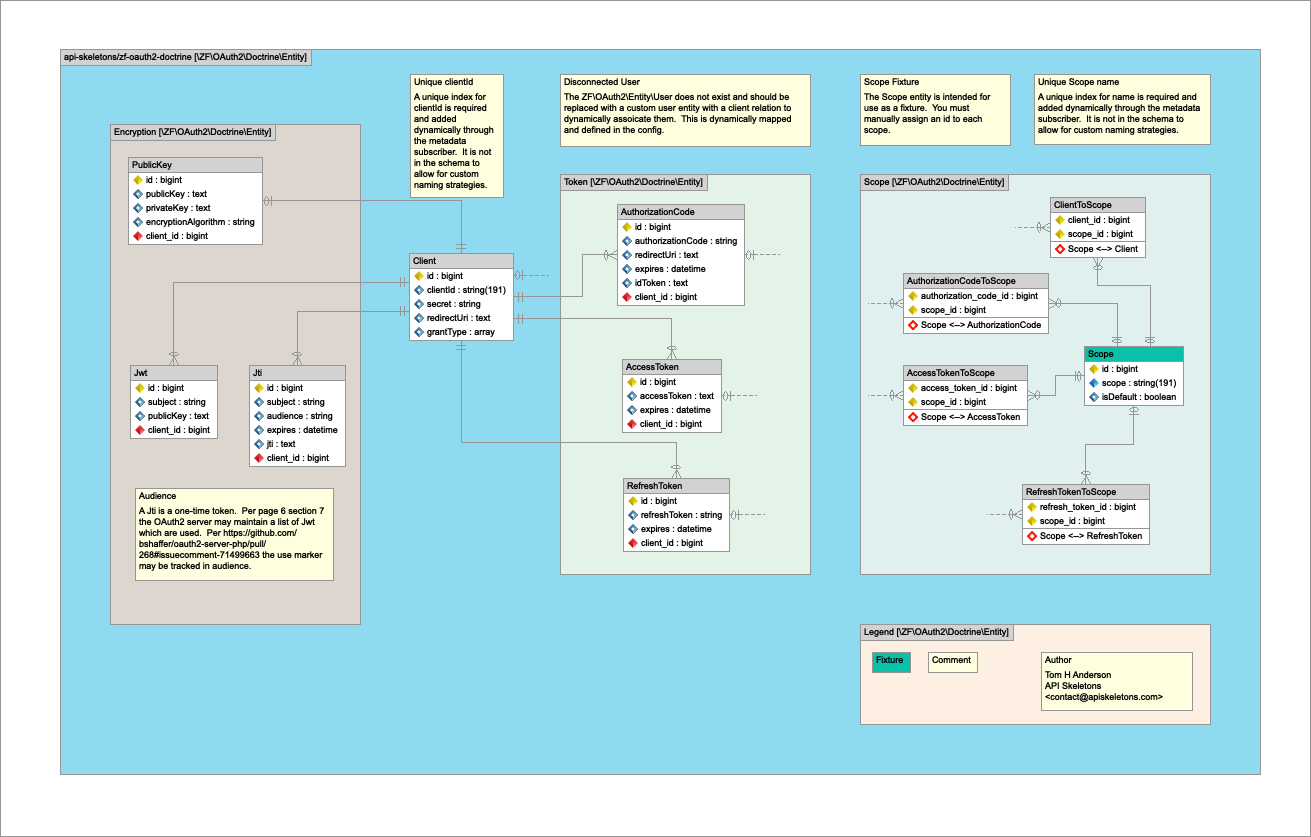In combination with ZfcUser and ZfcUserDoctrine I'm getting incorrect CONSTRAINTS
php public/index.php orm:schema-tool:create --dump-sql | grep user
CREATE TABLE user (user_id INT AUTO_INCREMENT NOT NULL, username VARCHAR(255) DEFAULT NULL, email VARCHAR(255) DEFAULT NULL, display_name VARCHAR(50) DEFAULT NULL, password VARCHAR(128) NOT NULL, state SMALLINT DEFAULT NULL, createdAt DATETIME NOT NULL, updatedAt DATETIME NOT NULL, UNIQUE INDEX UNIQ_8D93D649F85E0677 (username), UNIQUE INDEX UNIQ_8D93D649E7927C74 (email), PRIMARY KEY(user_id)) DEFAULT CHARACTER SET utf8 COLLATE utf8_unicode_ci ENGINE = InnoDB;
CREATE TABLE AccessToken_OAuth2 (id INT AUTO_INCREMENT NOT NULL, client_id INT NOT NULL, user_id INT DEFAULT NULL, accessToken VARCHAR(255) DEFAULT NULL, expires DATETIME DEFAULT NULL, INDEX IDX_C092BBF419EB6921 (client_id), INDEX IDX_C092BBF4A76ED395 (user_id), PRIMARY KEY(id)) DEFAULT CHARACTER SET utf8 COLLATE utf8_unicode_ci ENGINE = InnoDB;
CREATE TABLE AuthorizationCode_OAuth2 (id INT AUTO_INCREMENT NOT NULL, client_id INT NOT NULL, user_id INT DEFAULT NULL, authorizationCode VARCHAR(255) DEFAULT NULL, redirectUri LONGTEXT DEFAULT NULL, expires DATETIME DEFAULT NULL, idToken LONGTEXT DEFAULT NULL, INDEX IDX_7DED2FDD19EB6921 (client_id), INDEX IDX_7DED2FDDA76ED395 (user_id), PRIMARY KEY(id)) DEFAULT CHARACTER SET utf8 COLLATE utf8_unicode_ci ENGINE = InnoDB;
CREATE TABLE Client_OAuth2 (id INT AUTO_INCREMENT NOT NULL, user_id INT DEFAULT NULL, clientId VARCHAR(255) DEFAULT NULL, secret VARCHAR(255) DEFAULT NULL, redirectUri LONGTEXT DEFAULT NULL, grantType LONGTEXT DEFAULT NULL COMMENT '(DC2Type:array)', INDEX IDX_A66D48A8A76ED395 (user_id), UNIQUE INDEX idx_clientId_unique (clientId), PRIMARY KEY(id)) DEFAULT CHARACTER SET utf8 COLLATE utf8_unicode_ci ENGINE = InnoDB;
CREATE TABLE RefreshToken_OAuth2 (id INT AUTO_INCREMENT NOT NULL, client_id INT NOT NULL, user_id INT DEFAULT NULL, refreshToken VARCHAR(255) DEFAULT NULL, expires DATETIME DEFAULT NULL, INDEX IDX_EEBE59C919EB6921 (client_id), INDEX IDX_EEBE59C9A76ED395 (user_id), PRIMARY KEY(id)) DEFAULT CHARACTER SET utf8 COLLATE utf8_unicode_ci ENGINE = InnoDB;
// constraints
ALTER TABLE AccessToken_OAuth2 ADD CONSTRAINT FK_C092BBF4A76ED395 FOREIGN KEY (user_id) REFERENCES user (id);
ALTER TABLE AuthorizationCode_OAuth2 ADD CONSTRAINT FK_7DED2FDDA76ED395 FOREIGN KEY (user_id) REFERENCES user (id);
ALTER TABLE Client_OAuth2 ADD CONSTRAINT FK_A66D48A8A76ED395 FOREIGN KEY (user_id) REFERENCES user (id);
ALTER TABLE RefreshToken_OAuth2 ADD CONSTRAINT FK_EEBE59C9A76ED395 FOREIGN KEY (user_id) REFERENCES user (id);
// ...
ALTER TABLE AccessToken_OAuth2 ADD CONSTRAINT FK_C092BBF4A76ED395 FOREIGN KEY (user_id) REFERENCES user (user_id);
ALTER TABLE AuthorizationCode_OAuth2 ADD CONSTRAINT FK_7DED2FDDA76ED395 FOREIGN KEY (user_id) REFERENCES user (user_id);
ALTER TABLE Client_OAuth2 ADD CONSTRAINT FK_A66D48A8A76ED395 FOREIGN KEY (user_id) REFERENCES user (user_id);
ALTER TABLE RefreshToken_OAuth2 ADD CONSTRAINT FK_EEBE59C9A76ED395 FOREIGN KEY (user_id) REFERENCES user (user_id);
 Entity Relationship Diagram created with Skipper
Entity Relationship Diagram created with Skipper




